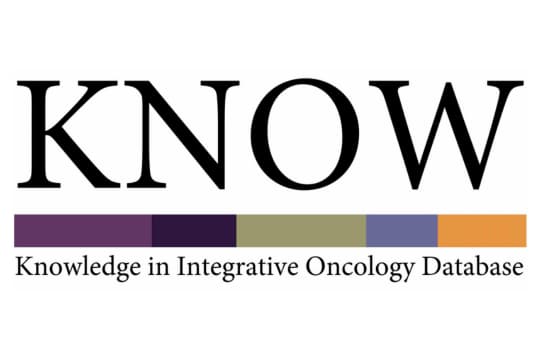This prescription drug is used off-label in low doses to treat people with cancer, with notable but very preliminary successes in cases where the cancers were difficult-to-treat or quite advanced.
Are you a health professional?
This section does not replicate the other information on this topic but provides additional details or context most relevant to professionals.
Modes of action: opioid receptors
Opioid receptors are involved in tumor growth, angiogenesis, and immunosuppression 1Carli M, Donnini S, Pellegrini C, Coppi E, Bocci G. Opioid receptors beyond pain control: The role in cancer pathology and the debated importance of their pharmacological modulation. Pharmacological Research. 2020 Sep;159:104938. Naltrexone has been found to prevent angiogenesis, although at modest magnitudes.2Zagon IS, McLaughlin PJ. Opioids and the apoptotic pathway in human cancer cells. Neuropeptides. 2003 Apr;37(2):79-88.
Low-dose naltrexone upregulates the expression of opioid growth factor receptor (OGFr) and OGFr antagonist, apparently suppressing colony formation, migration, and invasion in cervical cancer cells.3Liu N, Yan L et al. Low-dose naltrexone plays antineoplastic role in cervical cancer progression through suppressing PI3K/AKT/mTOR pathway. Translational Oncology. 2021 Apr;14(4):101028; Couto RD, Fernandes BJD. Low doses naltrexone: the potential benefit effects for its use in patients with cancer. Current Drug Research Reviews. 2021 Jan 26; Ma M, Wang X, Liu N, Shan F, Feng Y. Low-dose naltrexone inhibits colorectal cancer progression and promotes apoptosis by increasing M1-type macrophages and activating the Bax/Bcl-2/caspase-3/PARP pathway. International Immunopharmacology. 2020 Jun;83:106388. Naltrexone acts on all opioid receptors, blocking the interaction between OGF and OGFr.4Wang R, Zhang Y, Shan F. Interaction of opioid growth factor (OGF) and opioid antagonist and their significance in cancer therapy. International Immunopharmacology. 2019 Oct;75:105785.
Preclinical evidence
Notable preclinical evidence is listed here; clinical evidence is in How can low-dose naltrexone help you? What the research says ›
Improving treatment outcomes
Breast cancer
- Better survival rates among dogs with mammary cancer with LDN and chemotherapy compared to chemotherapy alone in a preclinical trial5Machado MC, da Costa-Neto JM et al. The effect of naltrexone as a carboplatin chemotherapy-associated drug on the immune response, quality of life and survival of dogs with mammary carcinoma. PLoS One. 2018 Oct 4;13(10):e0204830.
- Inhibited cancer cell growth of solid Ehrlich carcinoma in mice in a preclinical trial6Aboalsoud A, El-Ghaiesh SH, Abd Elmonem FF, Salem ML, Abdel Rahman MN. The effect of low-dose naltrexone on solid Ehrlich carcinoma in mice: the role of OGFr, BCL2, and immune response. International Immunopharmacology. 2020 Jan;78:106068.
- Less morphine-induced cell proliferation in triple-negative breast cancer cells treated with naltrexone in addition to morphine7Sezer G, Sahin F, Onses MS, Cumaoglu A. Activation of epidermal growth factor receptors in triple-negative breast cancer cells by morphine; analysis through Raman spectroscopy and machine learning. Talanta. 2024 May 15;272:125827.
Colorectal cancer
- More aggressive colon cancer in mice treated with naltrexone8Szymaszkiewicz A, Mierzejewski M et al. The role of bidirectional communication between the adipokines and the endogenous opioid system in an experimental mouse model of colitis-associated colorectal cancer. Pharmacological Reports. 2024 Feb;76(1):112-126.
Gynecological cancer
- Inhibited cervical cancer progression in nude mice in a preclinical trial9Liu N, Ma M et al. Low-dose naltrexone inhibits the epithelial-mesenchymal transition of cervical cancer cells in vitro and effects indirectly on tumor-associated macrophages in vivo. International Immunopharmacology. 2020 Sep;86:106718.
Head and neck cancer
- Slowed growth of squamous cell cancer of the head and neck in mice with LDN combined with exogenous opioid growth factor10McLaughlin PJ, Stucki JK, Zagon IS. Modulation of the opioid growth factor ([Met(5)]-enkephalin)-opioid growth factor receptor axis: novel therapies for squamous cell carcinoma of the head and neck. Head & Neck. 2012 Apr;34(4):513-9.
Neuroblastoma
- Lower tumor incidence, longer delays until tumor appearance, and increased survival time among neuroblastoma-inoculated mice receiving 0.1 mg of naltrexone per kilogram per day, compared to 10 milligrams of naltrexone per kilogram per day in a preclinical trial11Zagon IS, McLaughlin PJ. Naltrexone modulates tumor response in mice with neuroblastoma. Science. 1983 Aug;221:671-673.
Ovarian cancer
- Repressed tumor progression in mice with established ovarian tumors with LDN in combination with cisplatin but not taxol in preclinical studies12Donahue RN, McLaughlin PJ, Zagon IS. Low-dose naltrexone suppresses ovarian cancer and exhibits enhanced inhibition in combination with cisplatin. Experimental Biology and Medicine (Maywood). 2011 Jul;236(7):883-95.
- Reduced tumor nodule number and weight in mice with transplanted human ovarian cancer with either opioid growth factor or LDN compared to placebo13Donahue RN, McLaughlin PJ, Zagon IS. The opioid growth factor (OGF) and low dose naltrexone (LDN) suppress human ovarian cancer progression in mice. Gynecologic Oncology. 2011 Aug;122(2):382-8.
Pancreatic cancer
- In mice, pancreatic cancer treated with both naltrexone and tramadol was more invasive than pancreatic cancer treated with tramadol alone14Kuramochi T, Sano M, Kajiwara I, Oshima Y, Itaya T, Kim J, Ichimaru Y, Kitajima O, Masamune A, Ijichi H, Suzuki T. Effects of tramadol via a µ-opioid receptor on pancreatic ductal adenocarcinoma in vitro and in vivo. Regional Anesthesia and Pain Medicine. 2024 Mar 4;49(3):200-208.
Optimizing your body terrain
Inflammation
- Reduced inflammatory response in preclinical trials15Trofimovitch D, Baumrucker SJ. Pharmacology update: low-dose naltrexone as a possible nonopioid modality for some chronic, nonmalignant pain syndromes. American Journal of Hospice and Palliative Medicine. 2019 Oct;36(10):907-912; Kučić N, Rački V et al. Immunometabolic modulatory role of naltrexone in BV-2 microglia cells. International Journal of Molecular Sciences. 2021 Aug 5;22(16):8429.
Immune function
- Modulated mTOR/S6K expression in BV-2 microglial cells in a lab trial16Kučić N, Rački V et al. Immunometabolic modulatory role of naltrexone in BV-2 microglia cells. International Journal of Molecular Sciences. 2021 Aug 5;22(16):8429.
- Naltrexone blocked TLR4 (toll-like receptor 4) signaling in rats in a small lab study.17Hutchinson MR, Zhang Y et al. Non-stereoselective reversal of neuropathic pain by naloxone and naltrexone: involvement of toll-like receptor 4 (TLR4). European Journal of Neuroscience. 2008;28(1):20-29.
- Altered immune response with very low dosages (4.5 mg or less) in rats18Jankovic BD, Radulovic J. Enkephalins, brain and immunity: modulation of immune responses by methionine-enkephalin injected into the cerebral cavity. International Journal of Neuroscience. 1992;67(1-4): 241-270.
- Increased expression of macrophage markers and cytokines (tumor necrosis factor-α, TNF-α) in mice19Ma M, Wang X, Liu N, Shan F, Feng Y. Low-dose naltrexone inhibits colorectal cancer progression and promotes apoptosis by increasing M1-type macrophages and activating the Bax/Bcl-2/caspase-3/PARP pathway. International Immunopharmacology. 2020 Jun;83:106388.
Managing side effects and promoting wellness
Body composition
- Less weight loss associated with cisplatin in animals when LDN was added to treatment in a preclinical trial20Donahue RN, McLaughlin PJ, Zagon IS. Low-dose naltrexone suppresses ovarian cancer and exhibits enhanced inhibition in combination with cisplatin. Experimental Biology and Medicine (Maywood). 2011 Jul;236(7):883-95.
Quality of life
- Better quality of life among dogs with mammary cancer with LDN and chemotherapy compared to chemotherapy alone in a preclinical trial21Machado MC, da Costa-Neto JM et al. The effect of naltrexone as a carboplatin chemotherapy-associated drug on the immune response, quality of life and survival of dogs with mammary carcinoma. PLoS One. 2018 Oct 4;13(10):e0204830.
Helpful links for professionals

Li Z, You Y, Griffin N, Feng J, Shan F. Low-dose naltrexone (LDN): A promising treatment in immune-related diseases and cancer therapy. International Immunopharmacology. 2018 Aug;61:178-184.

Subscription required
Health professional comment
We invite health professionals to contribute expertise or send us questions.
"*" indicates required fields
References
